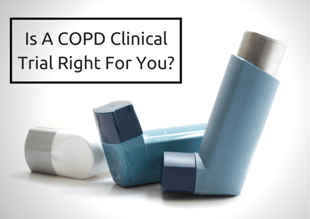COPD clinical trials exist to find more safe, effective treatments for the condition. They allow patients to have access to new investigational drugs, receive careful attention by physicians, and help the medical community make progress toward helping more people with COPD. But, clinical trials are not right for everyone.
Your health is the most important consideration, and if you qualify for the trial and can commit to the requirements expected of you, a COPD clinical trial may help your condition.
Qualifying for a COPD Trial 
All clinical trials have specific inclusion and exclusion requirements. One trial might require that all participants are part of a certain age group, or have a specific tobacco use history. Another might require that the participants are taking or have taken a certain medication for their COPD.
Since a COPD clinical trial involves using an investigational product, a pill or an inhaler, it is important that all potential subjects take the required background medications as required by the protocol.
If your condition requires alternative therapies, they may not be allowed by the trial protocol and therefore you may not qualify for the trial. However, if all the clinical trial's requirements are met and you qualify for the clinical trial, you can then be 'randomized' into the clinical research trial. Randomized is the term used to indicate that candidate for a trial has met the screening criteria and can now participate in the clinical trial.
Starting a COPD Clinical Trial
The clinical trial staff, including the physician investigator and the clinical research coordinator, will explain the trial drug to you and all of the specific requirements that you will need to know for your participation in the trial. You may be expected to keep a diary to record how you are doing on the investigational drug. Depending on the trial, it can be a paper or electronic diary.
You may also be required to complete questionnaires on an electronic device, such as a mini tablet. You may also be required to record your symptoms, when you take your medication, and if you used your rescue inhaler. It’s very important to keep accurate records – these records are used by the pharmaceutical companies to determine if the trial drug is effective or not. It is imperative to take this into consideration as it is a critical part of the clinical trial.
During the Trial
Once you are accepted into the trial and are randomized to the trial product, you’ll come to our clinical research site for routine visits at designated time points as dictated by the clinical trial's protocol. These visits may include obtaining your vital signs, pulmonary function testing, electrocardiograms, a physical by the physician investigator and a detail discussion on how your health has been since your last visit. Has it changed? Is the investigational medication making you feel better? Any adverse reactions that you may feel you are having?
We will go over any changes in your current medication regime as well. It is important to bring all of the trial medication and the diary to each appointment. The clinical research staff will go over everything, making sure you have been compliant with the trial medication and requirements, if there has been a COPD exacerbation, and discuss your condition. Compliance with all the of the trial procedures is vital. Subjects who cannot comply with the trial requirements may be withdrawn from the trial.
Reasons You Might Leave the Trial
As we said above, subjects must comply with all the requirements of the trial so that the research truly reflects the efficacy of the investigational product. If you don’t comply, the physician investigator might need to withdraw you from the trial. Another reason the physician investigator might withdraw you from the trial is if your condition worsens.
You might need additional medications that cannot be taken with the study medication, and since your health is our top priority, the physician investigator will recommend that you come off the study and will refer you back to your private physician for the treatment that is best for you. Participating in a clinical trial is voluntary so you may withdraw yourself at any time for any reason.
If you think a COPD clinical trial is right for you click on the button below to learn more.
Or, if you want to learn more about your COPD condition, download our whitepaper Living With COPD: A Guide To Better Treatment and Improved Breathing or click the button below.
Share This Post
Recent Posts
- The Relationship Between Obesity and Obstructive Sleep Apnea April 27 2015
- Cardiovascular Outcome Clinical Trials April 27 2015
- Diabetic Peripheral Neuropathic Pain April 27 2015
- Are All Types of Cholesterol Bad? April 27 2015
- Blood Pressure: The Highs, the Lows, and Everything in Between April 27 2015
Categories
- Clinical Trials
- Cardiovascular Disease
- Diabetes
- Obesity
- Kidney Disease
- Hypertension
- Pain Management
- Vaccine
- Cholesterol
- Chronic Obstructive Pulmonary Disease
- Diabetic Peripheral Neuropathy
- Migraine
- Osteoarthritis
- Biologics
- COVID-19
- Gastroesophageal Reflux Disease
- Irritable Bowel Syndrome with Constipation
- Lyme Disease
- Nonalcoholic Steatohepatitis
- Respiratory Syncytial Virus




